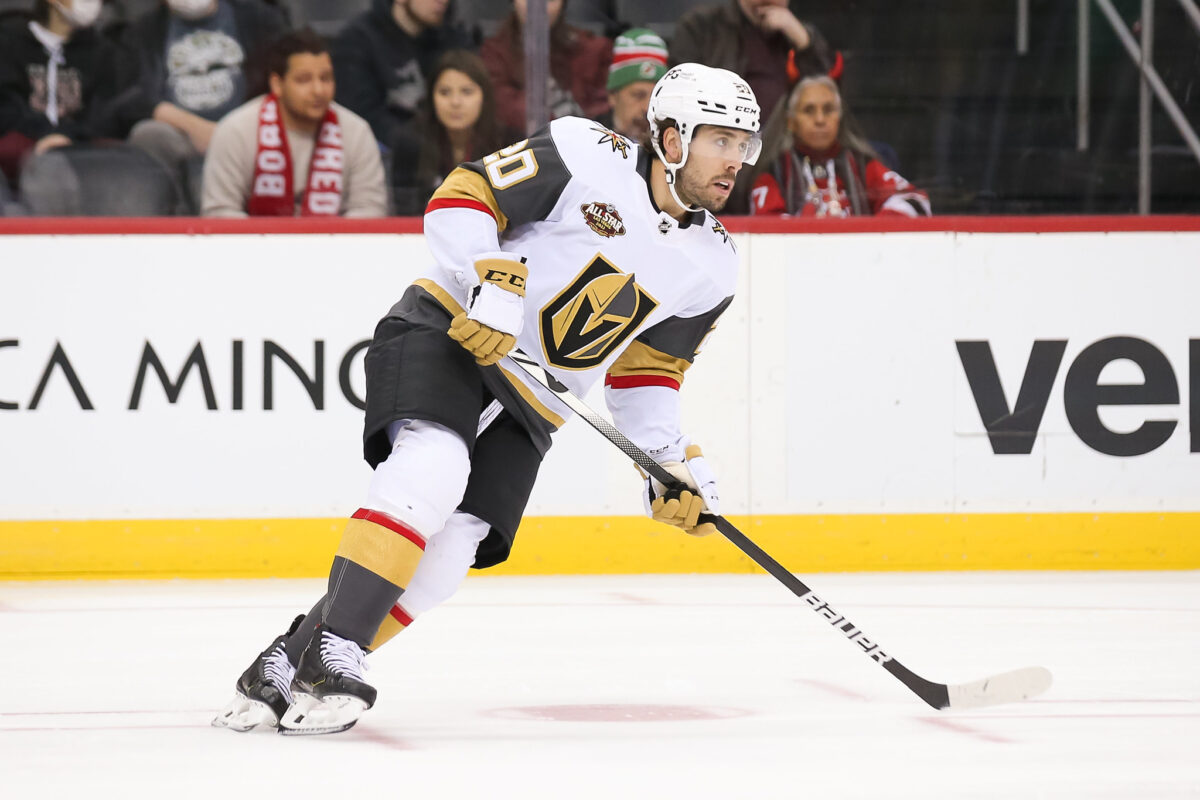The Vegas Golden Knights opened their Western Conference Final series with a 4-3 overtime win against the Dallas Stars on Friday night, in what was a wild back-and-forth game that ended up with the Golden Knights taking a 1-0 series lead.
Brett Howden was the overtime hero for the Golden Knights after he managed to bank the puck in off of Jake Oettinger’s pad from behind the net, giving him his third goal of the playoffs and his first career overtime winner.
YOUR GAME 1 OT HERO, BRETT HOWDEN! 🤩 pic.twitter.com/wpirgIgozA
— Sportsnet (@Sportsnet) May 20, 2023
Outside of the remarkable play from Roope Hintz, one of the biggest storylines for the Stars in these playoffs has been the shaky play from Jake Oettinger. While Oettinger is undoubtedly one of the best goaltenders in the NHL, he’s been surprisingly inconsistent in these playoffs, putting up a .929 save percentage (SV%) in their first round series against the Minnesota Wild but then falling off tremendously against the Seattle Kraken, finishing with a .877 SV% in that series.
Related: 4 Reasons Why the Dallas Stars Will Win the Stanley Cup
While Oettinger played noticeably better in this game, he still finished with a sub-.900 SV% for the fifth time in his last eight appearances. The Golden Knights have benefitted from struggling goaltenders throughout this postseason run, but if Oettinger can turn things around, it’s going to take another level of offensive production in order for them to win this series.
Golden Knights’ Pace of Play
From the first drop of the puck at T-Mobile arena, the Golden Knights were the faster and hungrier team. It was very clear that they had just played one of the fastest offensive teams in the NHL and their pace of play from their series against the Edmonton Oilers carried over into this game.
Their pace also translated into their special teams play, where the Golden Knights killed off both of the penalties they took in quick succession early in the first period. Their approach on the penalty kill was visibly different than in previous games, with the Golden Knights electing to play more aggressively in the neutral zone rather than sitting back and trying to limit scoring chances as best as they could, and the Stars had no time to adjust to their pressure.

Most importantly, their speed played a role in the final play of the game, with Chandler Stephenson winding up from inside the Golden Knights’ zone and flying by all of the Stars’ players to set up the final scoring chance. The pace of play was arguably the biggest factor in what made the Golden Knights so dangerous, and they’ll need to maintain that style of play in order to make it hard on the Stars moving forward.
Golden Knights’ Relentless Offense
While the first period was one of the best that they have played throughout the entire postseason, they still somehow found themselves down a goal. A strange deflection off of the boards following a clearing attempt resulted in a scoring chance for Roope Hintz, with Jason Robertson deflecting the shot past Adin Hill to open the scoring in this game.
Giving up the opening goal can be demoralizing, but the Golden Knights did not let up on their relentless pressure. It felt like every goal that the Stars scored was followed by a lengthy shift in the offensive zone from the Golden Knights, and every line was finding ways to generate scoring chances.
The Golden Knights dominated in pretty much every metric that measures a team’s offensive performance, which is something that hasn’t happened for them throughout this postseason run. They finished with over 63 percent of the expected goals share (xGF%), 60 percent of the scoring chances (SCF%), and 68 percent of the high-danger chances (HDCF%).
Seven of the Golden Knights’ nine playoff wins have been comeback victories, and while they won’t be happy about giving up two different leads of their own, they’ve proven that they’re built to overcome any obstacles they may face throughout this series.
Wild Bill Leads The Way
There are many players who have stepped up for the Golden Knights throughout this postseason, and this was William Karlsson’s breakout moment.
Karlsson finished with two pivotal goals and took over the goal scoring lead for the Golden Knights during these playoffs, and is now tied with his fellow misfit Jonathan Marchessault for second in the Golden Knights’ all-time playoff scoring with 56 points.

Karlsson’s line with Reilly Smith and Nicolas Roy was the best group throughout the whole game for the Golden Knights, accounting for two of their four goals, finishing with a 69.23 Corsi For percentage (CF%), and generating a game-high five high-danger chances (HDCF) while allowing just one high-danger chance against.
While Karlsson has been consistent when it comes to his point production, what makes this one of his best games of the playoffs was his involvement in plays without the puck. He had two blocked shots, a takeaway, killed penalties, and just generally made it hard on his opponents to generate chances while he was on the ice.
These are the little things that make the biggest difference in playoff hockey, and Karlsson’s performance should be looked at as the ideal way for the Golden Knights to play in order to win this series.